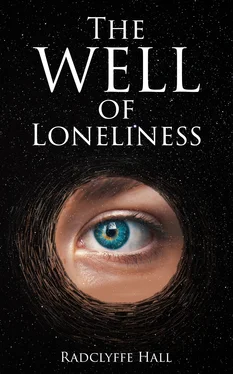‘Oh, yes, but they were, though!’ mocked Roger.
Now had Stephen been wise she would have let the thing drop, for no fun is derived from a one-sided contest, but at eight years old one is not always wise, and moreover her pride had been stung to the quick.
She said: ‘I’d like to see you get the brush; why you can’t stick on just riding round the paddock! I’ve seen you fall off jumping nothing but a hurdle; I’d like to see you out hunting!’
Roger swallowed some more cake; there was now no great hurry; he had thrown his sprat and had landed his mackerel. He had very much feared that she might not be drawn—it was not always easy to draw Stephen.
‘Well now, listen,’ he drawled, ‘and I’ll tell you something. You thought they admired you squatting on your pony; you thought you were being very grand, I’ll bet, with your new riding breeches and your black velvet cap; you thought they’d suppose that you looked like a boy, just because you were trying to be one. As a matter of fact, if you really want to know, they were busting their sides; why, my father said so. He was laughing all the time at your looking so funny on that rotten old pony that’s as fat as a porpoise. Why, he only gave you the brush for fun, because you were such a small kid—he said so. He said: “I gave Stephen Gordon the brush because I thought she might cry if I didn’t.” ’
‘You’re a liar,’ breathed Stephen, who had turned very pale.
‘Oh, am I? Well, you ask father.’
‘Do stop—’ whimpered Violet, beginning to cry; ‘you’re horrid, you’re spoiling my party.’
But Roger was launched on his first perfect triumph; he had seen the expression in Stephen’s eyes: ‘And my mother said,’ he continued more loudly, ‘that your mother must be funny to allow you to do it; she said it was horrid to let girls ride that way; she said she was awfully surprised at your mother; she said that she’d have thought that your mother had more sense; she said that it wasn’t modest; she said—’
Stephen had suddenly sprung to her feet: ‘How dare you! How dare you—my mother!’ she spluttered. And now she was almost beside herself with rage, conscious only of one overwhelming impulse, and that to belabour Roger.
A plate crashed to the ground and Violet screamed faintly. Roger, in his turn, had pushed back his chair; his round eyes were staring and rather frightened; he had never seen Stephen quite like this before. She was actually rolling up the sleeves of her smock.
‘You cad!’ she shouted, ‘I’ll fight you for this!’ And she doubled up her fist and shook it at Roger while he edged away from the table.
She stood there an enraged and ridiculous figure in her Liberty smock, with her hard, boyish forearms. Her long hair had partly escaped from its ribbon, and the bow sagged down limply, crooked and foolish. All that was heavy in her face sprang into view, the strong line of the jaw, the square, massive brow, the eyebrows, too thick and too wide for beauty. And yet there was a kind of large splendour about her—absurd though she was, she was splendid at that moment—grotesque and splendid, like some primitive thing conceived in a turbulent age of transition.
‘Are you going to fight me, you coward?’ she demanded, as she stepped round the table and faced her tormentor.
But Roger thrust his hands deep into his pockets: ‘I don’t fight with girls!’ he remarked very grandly. Then he sauntered out of the schoolroom.
Stephen’s own hands fell and hung at her sides; her head drooped, and she stood staring down at the carpet. The whole of her suddenly drooped and looked helpless, as she stood staring down at the carpet.
‘How could you!’ began Violet, who was plucking up courage. ‘Little girls don’t have fights—I don’t, I’d be frightened—’
But Stephen cut her short: ‘I’m going,’ she said thickly; ‘I’m going home to my father.’
She went heavily downstairs and out into the lobby, where she put on her hat and coat; then she made her way round the house to the stables, in search of old Williams and the dog-cart.
‘You’re home very early, Stephen,’ said Anna, but Sir Philip was staring at his daughter’s face.
‘What’s the matter?’ he inquired, and his voice sounded anxious. ‘Come here and tell me about it.’
Then Stephen quite suddenly burst into tears, and she wept and she wept as she stood there before them, and she poured out her shame and humiliation, telling all that Roger had said about her mother, telling all that she, Stephen, would have done to defend her, had it not been that Roger would not fight with a girl. She wept and she wept without any restraint, scarcely knowing what she said—at that moment not caring. And Sir Philip listened with his head on his hand, and Anna listened bewildered and dumbfounded. She tried to kiss Stephen, to hold her to her, but Stephen, still sobbing, pushed her away; in this orgy of grief she resented consolation, so that in the end Anna took her to the nursery and delivered her over to the care of Mrs. Bingham, feeling that the child did not want her.
When Anna went quietly back to the study, Sir Philip was still sitting with his head on his hand. She said: ‘It’s time you realized, Philip, that if you’re Stephen’s father, I’m her mother. So far you’ve managed the child your own way, and I don’t think it’s been successful. You’ve treated Stephen as though she were a boy—perhaps it’s because I’ve not given you a son—’ Her voice trembled a little but she went on gravely: ‘It’s not good for Stephen; I know it’s not good, and at times it frightens me, Philip.’
‘No, no!’ he said sharply.
But Anna persisted: ‘Yes, Philip, at times it makes me afraid—I can’t tell you why, but it seems all wrong—it makes me feel—strange with the child.’
He looked at her out of his melancholy eyes: ‘Can’t you trust me? Won’t you try to trust me, Anna?’
But Anna shook her head: ‘I don’t understand, why shouldn’t you trust me, Philip?’
And then in his terror for this well-beloved woman, Sir Philip committed the first cowardly action of his life—he who would not have spared himself pain, could not bear to inflict it on Anna. In his infinite pity for Stephen’s mother, he sinned very deeply and gravely against Stephen, by withholding from that mother his own conviction that her child was not as other children.
‘There’s nothing for you to understand,’ he said firmly, ‘but I like you to trust me in all things.’
After this they sat talking about the child, Sir Philip very quiet and reassuring.
‘I’ve wanted her to have a healthy body,’ he explained, ‘that’s why I’ve let her run more or less wild; but perhaps we’d better have a governess now, as you say; a French governess, my dear, if you’d prefer one—Later on I’ve always meant to engage a bluestocking, some woman who’s been to Oxford. I want Stephen to have the finest education that care and money can give her.’
But once again Anna began to protest. ‘What’s the good of it all for a girl?’ she argued. ‘Did you love me any less because I couldn’t do mathematics? Do you love me less now because I count on my fingers?’
He kissed her. ‘That’s different, you’re you,’ he said, smiling, but a look that she knew well had come into his eyes, a cold, resolute expression, which meant that all persuasion was likely to be unavailing.
Presently they went upstairs to the nursery, and Sir Philip shaded the candle with his hand, while they stood together gazing down at Stephen—the child was heavily asleep.
‘Look, Philip,’ whispered Anna, pitiful and shaken, ‘look, Philip—she’s got two big tears on her cheek!’
Читать дальше











